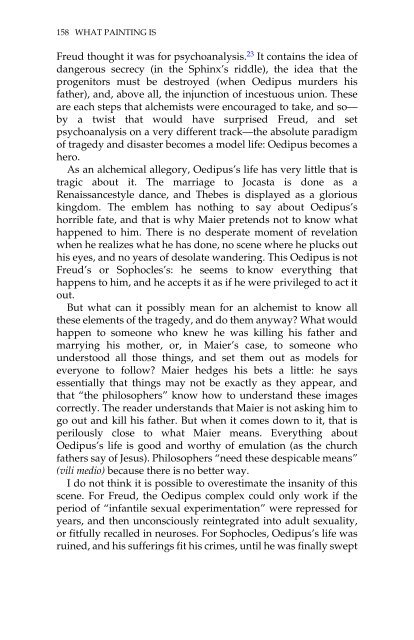What Painting Is: How to Think about Oil Painting ... - Victoria Vesna
What Painting Is: How to Think about Oil Painting ... - Victoria Vesna
What Painting Is: How to Think about Oil Painting ... - Victoria Vesna
Create successful ePaper yourself
Turn your PDF publications into a flip-book with our unique Google optimized e-Paper software.
158 WHAT PAINTING IS<br />
Freud thought it was for psychoanalysis. 23 It contains the idea of<br />
dangerous secrecy (in the Sphinx’s riddle), the idea that the<br />
progeni<strong>to</strong>rs must be destroyed (when Oedipus murders his<br />
father), and, above all, the injunction of incestuous union. These<br />
are each steps that alchemists were encouraged <strong>to</strong> take, and so—<br />
by a twist that would have surprised Freud, and set<br />
psychoanalysis on a very different track—the absolute paradigm<br />
of tragedy and disaster becomes a model life: Oedipus becomes a<br />
hero.<br />
As an alchemical allegory, Oedipus’s life has very little that is<br />
tragic <strong>about</strong> it. The marriage <strong>to</strong> Jocasta is done as a<br />
Renaissancestyle dance, and Thebes is displayed as a glorious<br />
kingdom. The emblem has nothing <strong>to</strong> say <strong>about</strong> Oedipus’s<br />
horrible fate, and that is why Maier pretends not <strong>to</strong> know what<br />
happened <strong>to</strong> him. There is no desperate moment of revelation<br />
when he realizes what he has done, no scene where he plucks out<br />
his eyes, and no years of desolate wandering. This Oedipus is not<br />
Freud’s or Sophocles’s: he seems <strong>to</strong> know everything that<br />
happens <strong>to</strong> him, and he accepts it as if he were privileged <strong>to</strong> act it<br />
out.<br />
But what can it possibly mean for an alchemist <strong>to</strong> know all<br />
these elements of the tragedy, and do them anyway? <strong>What</strong> would<br />
happen <strong>to</strong> someone who knew he was killing his father and<br />
marrying his mother, or, in Maier’s case, <strong>to</strong> someone who<br />
unders<strong>to</strong>od all those things, and set them out as models for<br />
everyone <strong>to</strong> follow? Maier hedges his bets a little: he says<br />
essentially that things may not be exactly as they appear, and<br />
that “the philosophers” know how <strong>to</strong> understand these images<br />
correctly. The reader understands that Maier is not asking him <strong>to</strong><br />
go out and kill his father. But when it comes down <strong>to</strong> it, that is<br />
perilously close <strong>to</strong> what Maier means. Everything <strong>about</strong><br />
Oedipus’s life is good and worthy of emulation (as the church<br />
fathers say of Jesus). Philosophers “need these despicable means”<br />
(vili medio) because there is no better way.<br />
I do not think it is possible <strong>to</strong> overestimate the insanity of this<br />
scene. For Freud, the Oedipus complex could only work if the<br />
period of “infantile sexual experimentation” were repressed for<br />
years, and then unconsciously reintegrated in<strong>to</strong> adult sexuality,<br />
or fitfully recalled in neuroses. For Sophocles, Oedipus’s life was<br />
ruined, and his sufferings fit his crimes, until he was finally swept


